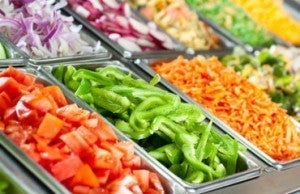Guidelines, recipes, and other resources for creating and promoting healthy, delicious foods in schools and at work sites.
- Sustainable Meeting and Event Guide: Cultivate a culture of health in how you plan and design campus meetings and events, by providing opportunities to eat well and stay active while reducing environmental impact. Promoting sustainable diets contributes to food security, human health, animal welfare, natural resource preservation, and climate change mitigation.
- What’s for Lunch at HSPH? (PDF): A cafeteria brochure with healthy eating guidelines, from the Dept. of Nutrition at HSPH
- Delicious & Nutritious Food Choices for Conferences (PDF): Trans fat-free, healthy menus for breakfast, lunch, and dinner, designed for meeting and event organizers; developed by the Dept. of Nutrition at Brigham and Women’s Hospital, working with the Dept. of Nutrition at HSPH
- : Science-based strategies and culinary insights from the HSPH Dept. of Nutrition and The Culinary Institute of America on how to preserve flavor and cut back on salt
- : Handouts describing the Healthy Eating Pyramid and healthy beverage guidelines; from at Harvard University Dining Services
- Nutrition Standards for School Meal Programs: Commentary from the HSPH Dept. of Nutrition on the USDA’s proposed rule on school meal nutrition guidelines, April 12, 2011.
- Misguided Moves Thwart Healthier School Lunch: Congress has overturned a plan that would limit French fries in school lunch. And it’s scrapped or stalled other healthy menu changes that would boost vegetables and lower salt.
- Cafeteria Audit(PDF): Checklist to help employers assess availability of healthy choices in worksite cafeterias; excerpt from Promoting Better Nutrition in the Workplace: Employer Strategies, National Business Group on Health, 2004
Food Service Recipes
These food service quantity recipes are from Sebastian’s Café, the cafeteria at the Harvard T.H. Chan School of Public Health. They reflect the Department of Nutrition’s science-based, trustworthy guidance on healthy eating, and adhere to the following principles:
- Fresh whole foods with great flavor are vital.
- Unsaturated fats, such as those found in vegetable oils, are preferred.
- Whenever possible, added sugars are kept to a minimum.
- Trans fatty acids from partially hydrogenated vegetable oils are eliminated.
- Whole grains are an important part of menu planning.
- Fruits and vegetables, especially leafy greens, are featured.
Each recipe yields 100 servings and includes single-serving nutrition information.
Entrées
- Oven-Roasted Catfish with a Spicy Creole Tomato Sauce
- Rosemary-Seared Breast of Chicken with Mushrooms, Spinach, and Artichoke Hearts
- Seared Cod Fillets with Roasted Vegetable–Chili Broth and Sage Pesto
- Steamed Salmon Filet with Fresh Dill and Lemon
- Tuscan-Style Roasted Chicken with Basil, White Beans, and Tomatoes
- Whole Wheat Linguine with Roasted Vegetables and Fresh Herbs
Soups
- Chicken Escarole Soup
- French Onion Soup with Beef Broth
- Roasted Butternut Squash Soup
- Tofu-Ginger Vegetable Soup
- Turkey Noodle Soup
- White Bean, Wheat Berry, and Escarole Soup
Terms of Use
The contents of this website are for educational purposes and are not intended to offer personal medical advice. You should seek the advice of your physician or other qualified health provider with any questions you may have regarding a medical condition. Never disregard professional medical advice or delay in seeking it because of something you have read on this website. The Nutrition Source does not recommend or endorse any products.
